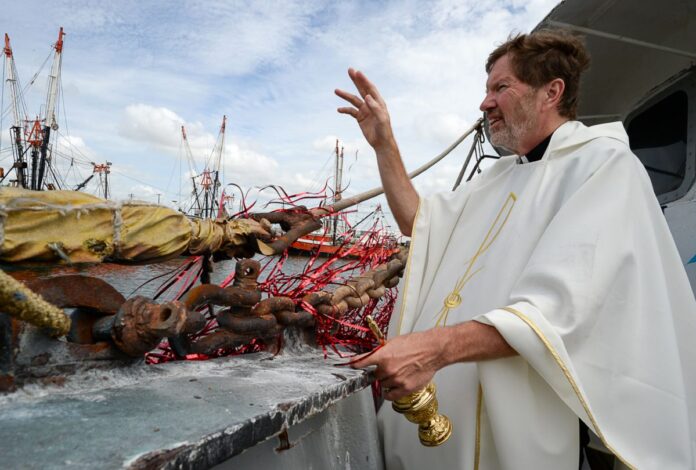The Texas shrimp industry faces an especially daunting challenge this year, a reality echoed in the fierceness of Father Mark Watters’ blessing-of-the-fleet sermon Monday at the Brownsville Shrimp Basin.
It was Watters’ 12th year blessing the Brownsville-Port Isabel shrimp fleet, though it’s doubtful he has ever raised the roof like he did Monday with a 25-minute pep talk that started quietly before building to a shouting crescendo, Watters promising the few dozen assembled that “Jesus is in the mountain-moving business.”
He didn’t mince words when citing the difficulties the fleet faces this year, namely, a dire shortage of workers from Mexico.
The situation is caused by the failure of Congress to renew the H-2B Returning Worker Program, leaving boat owners and shrimp processors in a lurch. Andrea Hance, executive director of the Texas Shrimp Association, said as much as 20 percent of the Brownsville-Port Isabel fleet will stay tied up rather than heading out for the new season, which starts July 15.
Many boats that do go out will do so with skeleton crews, which means they won’t be able to handle as many shrimp. Adding insult to injury is the fact that this season is projected to be the best in years, Hance said.
“ All the indicators show, with low fuel prices, there’s an abundance of shrimp out there and the prices have remained fairly stable,” she said. “This was going to be our year.”
A shortage of crew members also means boats won’t be able to head as many of the shrimp they do catch, which decreases the value. Head-on shrimp is worth about $2 less a pound at the dock than headless, Hance said.
The industry is fighting a misperception that it would rather hire Mexican H-2B visa workers than U.S. workers because they’re cheaper, Hance said, though the truth is that finding Americans to crew shrimp boats is practically impossible despite the industry’s best efforts.
The few who do respond to want ads rarely come back after the first day. Those who make it through training and head out to the Gulf on a boat more often than not have to be brought back in a matter of days. Crewing a shrimp trawler is hard, dangerous work, Hance said.
“ When we put an inexperienced person on this boat, there’s probably about a 95-percent chance that person will quit in the first week, so you’re asking that boat owner to turn the boat around, use the fuel to get back,” she said. “It costs the boat owner and the crew because they’re not able to fish.”
Inexperienced crew members are also a big liability for boat owners, which is another reason many are choosing to leave their vessels in port, to avoid the risk, Hance said. The Mexican H-2B workers, in contrast, usually know their way around a shrimp boat by the time they get here, she said.
“ These guys come over, they’re already seasoned,” Hance said. “They want to come over and work, they pay taxes, they go back home and it works great. … We do try and hire American. Actually it costs us a lot of money for us to bring that visa worker. It costs a couple thousand dollars per worker, not to count the time it takes to fill out all the paperwork.”
The shrimp industry has a substantial impact on the Texas economy, though nothing on the magnitude of the cattle industry, for instance, thus it’s hard to get lawmakers’ attention, she said. An exception is state Rep. Rene Oliveira, D-Brownsville, who was among the speakers at Monday’s blessing ceremony and blamed the visa situation on “failed policies in Washington.” Hamstringing the Texas shrimp industry just further hands the advantage to foreign shrimp producers, he said.
Hance said U.S. Rep. Filemon Vela, D-Brownsville, also supports the industry, and that she hopes the message gets to Washington that the policy needs to change. She said the presence of television crews from CBS and HBO’s “Vice” program at the blessing ceremony would help spread the word nationally.
“ It really knocked me over when HBO called, and then CBS Evening News called the next day,” Hance said.
While stopping short of calling the current situation a death blow, she said the Texas shrimp industry can’t continue to operate this way.
“ I don’t think that I would say it’s going to be the demise of our industry because we’ve overcome so much, but I fear that it’s going to be devastating,” Hance said. “I’m trying to be optimistic.”




